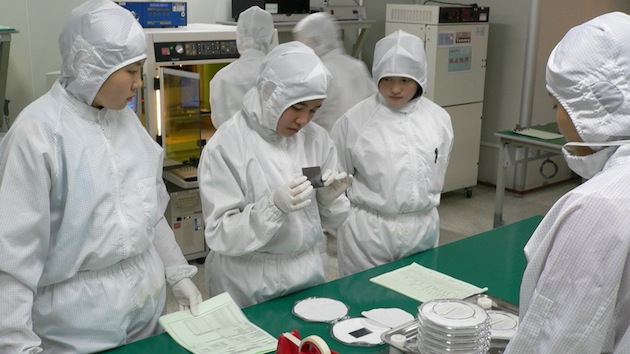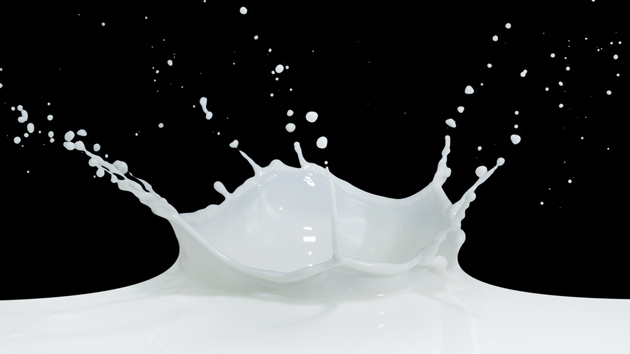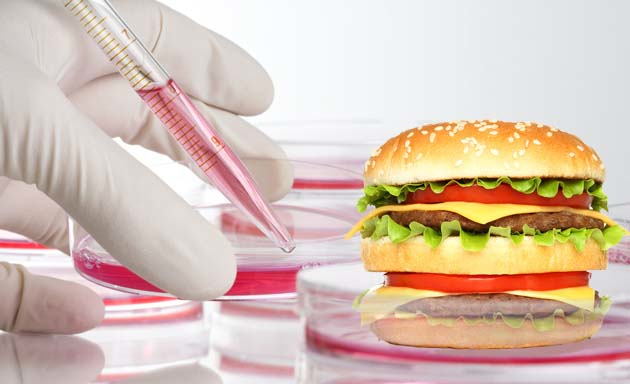
Synthetic biology—or “synbio” for short—is the stuff of science fiction brought to life. Whereas standard-issue biotechnology involves inserting a gene from one organism into another, synbio entails stuff like inserting computer-generated DNA sequences into living cells: i.e, creating new organisms altogether. And the technology has made a major breakthrough: A company called Evolva has managed to create a compound called vanillin—the one that gives vanilla beans their distinctive and wildly popular flavor—grown not on a vine but rather in a culture of synthetic yeast.
Even though you’ll likely soon be ingesting its products, synbio—like nanotechnology, which I looked at in two posts last week—is virtually unregulated and can show up in consumer products without any labeling requirements. But unlike nanotech, whose tiny particles already pervade more than 1600 consumer products (including 96 food ones), the industry around synthetic biology is only beginning its push its inventions into things we encounter daily.
According to a recent piece by The New York Times’ excellent Stephanie Strom, food and cosmetics manufacturers are “reticent” to disclose their use of synbio. But consumer products that likely contain synbio-derived oils, she reports, include laundry detergent made by the Belgian company Ecover; Lux, a shower soap made by Unilver; and a slew of mostly unnamed beauty products (examples include Elizabeth Arden Visible Difference moisture cream) that include a synbio oil from a company called Amyris.
Next up: food additives—synthetically derived replicas of vanillin, resveratrol, and citrus, Strom reports.
If a bunch of hidden additives sounds like a modest achievement for a technology that creates life itself, well, it is. The industry has grander dreams. In a 2011 Scientific American interview, the scientist/magnate Craig Venter—the man who led the mapping of the human genome—laid them out:
[Venter’s] reengineered photosynthetic cells would take in carbon dioxide and sunlight and spew out hydrocarbons ready for the ExxonMobil refinery (the oil giant that has provided Venter’s company Synthetic Genomics with $300 million in funding to date). In the process, the algae will turn a problem—CO2 causing climate change—and transform it into a solution—renewable fuels and slowed global warming. “Trying to capture CO2 and bury it is just dumb; it’s going to be the renewable feedstock for the future,” he said.
So how did the industry alight upon face creams, fragrances, and laundry soap on the way to Venter’s bio-enginered energy utopia? The bridge was supposed to be cellulosic ethanol, which is made from the non-edible part of plants: stuff like grass, wood chips, and crops wastes like corn stalks. The trick is cheaply breaking down that tough plant matter, known as cellulose, into simple sugars that can be fermented. Synbio offered a solution: synthesized yeasts designed to feed on cellulose.
But a funny thing happened on the way to the synbio energy revolution. It turns out that the industry has yet to produce these wonder fuels at prices at anywhere near those of with existing sources like petroleum—and so, as this January Nature article shows, the industry has unceremoniously turned away from them. To find a marketable product and keep investors happy, the industry pivoted from the grandiose to the mundane.
Thus Evolva and its magic vanillin. “It will be the first major synthetic-biology food additive to hit supermarkets,” Nature reports. And we should expect more of the same:
The product marks a shift for the industry, which has typically focused on the synthesis of drugs and commodities such as biofuels and rubber. Now, synthetic-biology companies are turning to ‘fine chemicals’: food and fragrance ingredients that command high prices in small batches. “The products take less time to develop, they take less money to develop, and they’re much less risky,” says [Evolva exec Neil] Goldsmith.
The math is stark: High-end food ingredients and other “fine chemicals” can “command prices of the order of $10–10,000 per kilogram, compared with around $1 per kilogram for biofuels,” Nature reports.
And Evolva’s product will not be competing with the vast amount of cheap imitation vanillin that now floods the market. Its yeasts create a compound that replicates the vanillin found in real beans—and thus will compete directly with the premium-priced natural vanilla market now owned by farmers in places like Madagascar and Mexico.
“These additives can be swapped for those extracted from nature and still legally be called natural because they are made by living organisms (typically, yeast),” Nature reports. And you likely won’t know it when you buy a pint of high-end ice cream from a company that uses it. Since the synbio ingredients “will be added after the yeast has been removed,” Nature reports, “the ingredient itself need not be labeled in any particular way.”
According to the trade magazine Chemical & Engineering News, the ubiquitous petroleum-derived artificial vanillin fetches just $10 per kilogram, while “vanillin made in a way that can be labeled natural can cost hundreds of dollars per kg.”
Meanwhile, the industry, which trumpeted its aspirations to take over the energy market, has suddenly gone shy as it sets its sights on fancy ingredients. While major technical hurdles have kept the industry from making cheap biofuels, the Nature piece pithily summed up the main obstacle the industry must overcome before it can dominate the ingredients market: “consumer rejection.” In short, people might prove to be creeped out by test-tube vanillin and demand the old-fashioned kind instead.
In response, the industry seems to be resorting to a bit of rhetorical engineering. Earlier this year, the watchdog group Friends of the Earth got hold of a leaked agenda of a planned closed-door industry meeting on how to sell the public on synbio as the “foundation for the future of sustainable food.” The group publicized the meeting and asked to attend. The industry initially demurred but ultimately invited FOE to send a representative.
Dana Perls, FOE’s food and technology campaigner, accepted the invite and filed this report of the event. She writes:
Topics not discussed included risks to the environment; potential impacts on hundreds of thousands of small, low-income farmers; the lack of independent, transparent health and environmental assessments; and the lack of federal and international regulations. When I brought up these glaring omissions, my concerns were generally dismissed.
Instead, Perls reports, the meeting focused on language—the industry should avoid phrases like “synbio” (too close to “sin”) and “genetic engineering,” and focus instead on terms like “fermentation derived” and “nature identical.”
In a future post, I’ll look at some of the concerns raised by Perls and ignored by the participants.
















